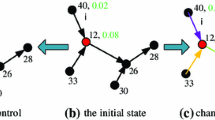Abstract
In infrastructure-less wireless sensor networks, with the requirements of saving energy and improving the network throughput, this paper proposes a non-cooperative game theory power control strategy based on CDMA wireless sensor networks. Based on (successive interference cancellation, SIC) of multi-packet reception theory in sink nodes, transmission power control scheme for sensor nodes is proposed. Specifically, this paper combines SIC algorithm and non-cooperative game theory, it discusses the Nash Equilibrium for the power control strategy, and it also proposes that as long as transmission power of sensor nodes meet transmission power threshold, it can satisfy non-cooperative game theory power control. Compared with other power control strategies in WSN, simulation results prove that the non-cooperative game theory power control scheme is effective; it also saves sensor nodes’ energy, obtains good performance for the whole network and greatly improves the network lifetime.







Similar content being viewed by others
References
Mackenzie, A. B., & Wicker, S. B. (2001). Game theory in communications: Motivation, explanation, and application to power control. In Global telecommunications conference, 2001. GLOBECOM ‘01. IEEE (Vol. 2, pp. 821–826). IEEE.
Dasilva, L., Bogucka, H., & Mackenzie, A. (2011). Game theory in wireless networks. IEEE Communications Magazine,49(8), 110–111.
Bharathi, S., & Kumar, D. (2017). Effective power allocation with uniform pricing model based on game theory in nano-computing environment of cognitive radio network. Journal of Computational and Theoretical Nanoscience,14(1), 291–298.
Salih, Y. K., See, O. H., & Ibrahim, R. W. (2016). An intelligent selection method based on game theory in heterogeneous wireless networks. Transactions on Emerging Telecommunications Technologies,27, 1641–1652.
Narayanaswamy, S., Kawadia, V., Sreenivas, R. S., & Kumar, P. R. (2002). Power control in ad-hoc networks: Theory, architecture, algorithm and implementation of the COMPOW protocol (pp. 156–162).
Pappas, G. J., Pappas, G. J., Pappas, G. J., Pappas, G. J., Pappas, G. J., Pappas, G. J., et al. (2016). Atpc: Adaptive transmission power control for wireless sensor networks. ACM Transactions on Sensor Networks,12(1), 6.
Shi, H. Y., Wang, W. L., Kwok, N. M., & Chen, S. Y. (2012). Game theory for wireless sensor networks: A survey. Sensors,12(7), 9055–9097.
Byun, S. S., & Balasingham, I. (2008). Power control for mission critical wireless sensor networks using repeated coalitional games. In MILCOM 2008–2008 IEEE military communications conference (pp. 1–7). IEEE.
Sun, Q., Zeng, X., Chen, N., Ke, Z., & Rasool, R. U. (2008). A non-cooperative power control algorithm for wireless Ad Hoc and sensor networks. In International conference on genetic and evolutionary computing (pp. 181–184). IEEE.
Ren, H., & Meng, Q. H. (2009). Game-theoretic modeling of joint topology control and power scheduling for wireless heterogeneous sensor networks. IEEE Transactions on Automation Science and Engineering,6(4), 610–625.
Niyato, D., Hossain, E., Rashid, M. M., & Bhargava, V. K. (2007). Wireless sensor networks with energy harvesting technologies: A game-theoretic approach to optimal energy management. IEEE Wireless Communications,14(4), 90–96.
Wang, W., Chatterjee, M., & Kwiat, K. (2008). Enforcing cooperation in ad hoc networks with unreliable channel. In IEEE international conference on mobile Ad Hoc and sensor systems (pp. 456–462). IEEE.
Zhang, X., Cai, Y., & Zhang, H. (2006). A game-theoretic dynamic power management policy on wireless sensor network. In International conference on communication technology (pp. 1–4). IEEE.
Zeng, J., Mu, C., & Hu, J. (2007). Game theoretic energy balance routing in wireless sensor networks. In Control conference, 2007. CCC (pp. 420–424). IEEE.
Sengupta, S., Chatterjee, M., & Kwiat, K. (2009). A game theoretic framework for power control in wireless sensor networks. IEEE Transactions on Computers,59(2), 231–242.
Jiang, C., Shi, Y., Hou, Y. T., & Lou, W. (2012). Squeezing the most out of interference: An optimization framework for joint interference exploitation and avoidance. In INFOCOM, 2012 proceedings IEEE (Vol. 131, pp. 424–432). IEEE.
Andrews, J. G., & Meng, T. H. (2016). Performance of multicarrier cdma with successive interference cancellation in a multipath fading channel. Communications IEEE Transactions on,52(5), 811–822.
Acknowledgements
The authors would like to thank the anonymous reviewers and editors for their valuable comments. The material presented in this paper is supported by the Grant of the National Natural Science Foundation of China, No. 61672204, the Grant of Major Science and Technology Project of Anhui Province, No. 17030901026, The grant of Key Constructive Discipline Project of Hefei University, No. 2016xk05, the Grant of Natural Science Fund Project of Anhui Province, No. KJ2018A0557, the Grant of Talent Fund Project of Hefei University, No. 16-17RC17.
Author information
Authors and Affiliations
Corresponding author
Additional information
Publisher's Note
Springer Nature remains neutral with regard to jurisdictional claims in published maps and institutional affiliations.
Rights and permissions
About this article
Cite this article
Hu, S., Wang, X. Game Theory on Power Control in Wireless Sensor Networks Based on Successive Interference Cancellation. Wireless Pers Commun 111, 33–45 (2020). https://doi.org/10.1007/s11277-019-06843-8
Published:
Issue Date:
DOI: https://doi.org/10.1007/s11277-019-06843-8




